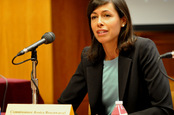This article is more than 1 year old
Civil war erupts at top of FCC over Sinclair's creepy grasp on US telly
Commissioners take to the stage to hate on one another amid $4bn media merger
Vid Internecine fights at America's Federal Communications Commission (FCC) have broken out in public at an industry event in Las Vegas.
In a series of speeches given by four of the watchdog's five commissioners at the National Association of Broadcasters annual event in Sin City, the policymakers traded barbs over its apparent coziness with media giant Sinclair Broadcasting: a relationship that has led to an internal investigation into FCC chairman Ajit Pai.
The commission is due to decide on whether a proposed $3.9bn merger between Sinclair and smaller rival Tribune Media can go ahead – a merger that was only made possible through actions taken by the FCC. The merged company would gain an enormous media footprint reaching 72 per cent of the United States.
Commissioner Jessica Rosenworcel was up first and used her time at the podium to talk about the First Amendment and free press: an unusual broad and philosophical topic given the fact that the FCC oversees the telecoms industry.
But the topic was of course directly tied to a series of controversial decisions by the FCC Republican majority of chairman Ajit Pai and fellow commissioners Michael O'Reilly and Brendan Carr to change FCC rules around media ownership – all of which benefit Sinclair Broadcasting.
Rosenworcel did not stop at Sinclair: she drew a line between President Trump and his predilection for calling reports that don’t fit his agenda "fake news" with a dangerous loss of accountability in the federal government.
She noted historical efforts – including by Richard Nixon – to use the FCC to further political goals, and used Trump's threat to revoke NBC's license back in October as an indication of how "the specter of fake news intersected with the work of the FCC" before turning to Sinclair.
Bargain
"More recently, the FCC has been changing its media policy rules from front to back – bringing back the scientifically obsolete UHF discount, changing how many of the most-watched stations a single broadcaster can own in a market, and ending the rule that requires the ability to broadcast from the city where a station is licensed," she noted.
"Some of these policies are in need up updating… But collectively, they have the distinction of clearing the way for a transaction right now pending before the FCC. It’s a merger that could result in a single broadcast company – Sinclair – having the unprecedented ability to reach 72 percent of our nation’s households."
She then alleged – in public and on stage – that Sinclair was "not only getting special treatment from the FCC, it's getting a special call-out from the Executive Branch" – a reference to recent media reports that President Trump met with Sinclair's chairman David Smith at the White House.
This past week, Sinclair was also subject to nationwide attention when it obliged news anchors across the US to read the same script about so-called fake news – a disturbing situation that was expertly highlighted in a video that patched together the clips.
"We need to stand up, speak out, and call out when government is being used as a tool to attack the conditions that make it possible for news to serve as a check on power," said Rosenworcel. "We cannot allow the cry of fake news to extinguish our inquiry into hard subjects, diminish our willingness to seek truth, or temper our support for the First Amendment."
The accusation that the FCC was doing the bidding of the White House in order to push a political agenda was then addressed by chair Pai – who is currently under investigation by the FCC's Inspector General over whether he has acted to "improperly benefit" Sinclair.
All about philosophy, see
Pai didn't mention Sinclair by name but instead made repeated reference to the "philosophical" approach he has adopted that have driven his decision.
"Each of our decisions has presented a basic philosophical choice about moving forward or looking backward. And on each, we’ve made the right choice – for broadcasters and consumers alike," Pai claimed.
"You either believe broadcasters should be allowed to innovate, or you don't," he argued and said that the decision to move forward with the unfinished ATSC 3.0 standard – aka "Next Gen TV" – was a part of that move.
Others see the decision as premature and point to the fact that one of the main beneficiaries of the technology will be Sinclair Broadcasting thanks to the patents it holds on the technology: patents worth potentially billions of dollars.
"By allowing use of this standard on a voluntary, market-driven basis, we’ve opened the door to a substantially improved, free, over-the-air television broadcast service and fiercer competition in the video marketplace," argued Pai before noting, "unfortunately, we ran up against some resistance."
He argued that the claims against ATSC 3.0 were little more than "demands that we strangle Next Gen TV in its infancy with extensive regulation" and were a "shameful attempt to block progress." Critics argue that the fact the standard is not backwards-compatible i.e. you will have to buy new equipment to make it work should make the regulator go much more slowly.
Pai then addressed another controversial decision proposed and approved by himself to loosen up media ownership rules. He claimed this decision was simply a way to update the media landscape in the internet era.
"With the proliferation of online news sources, cable TV, and more, the idea that a company could dominate a media market by owning a broadcast station and a newspaper is utter nonsense," he argued. "That's why we scrapped the 'main studio' rule."

